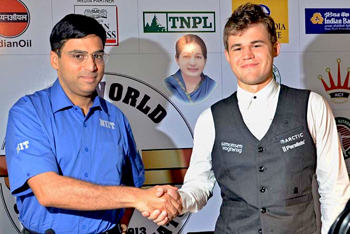 New Delhi, Nov 8: "I've learnt from Anand but I think I showed him in a way that although he has taught me many things in the past, now it's probably my turn to teach him."
New Delhi, Nov 8: "I've learnt from Anand but I think I showed him in a way that although he has taught me many things in the past, now it's probably my turn to teach him."
These were Magnus Carlsen's exact words after defeating Vishwanathan Anand in the FIDE World Chess Championship Match that was held in Chennai last year. The final scoreline read Carlsen-6.5: Anand-3.5. Carlsen won 3 games and 7 games were drawn. Anand could not muster a single victory.
But Anand was not done yet. He bounced back by winning the Candidates Tournament in 2014 and followed it up by winning the Bilbao Final Masters.
"This time it will be much closer than the last," says Arjuna awardee Grandmaster Abhijeet Gupta, who has tagged Carlsen as his 'favourite'.
Anand has won 5 World Championships and has been the Numero Uno. He has won everything that the sport has to offer.
But his greatest achievement has been that he has single-handedly made chess popular as a sport in a nation of over 100 million cricket crazy citizens. The sport which took birth in India as 'Chaturanga' is played avidly today and followed in the country chiefly due to the contributions of this one man.
"Vishy (Vishwanathan Anand) has already influenced an entire generation of chess players. He is probably the best sportsperson that India has produced after Sachin Tendulkar," says Tania Sachdev, an International Master, while commentating during the 2013 match at Chennai.
India has had a 'rich' tradition of not excelling at individual sports. Exceptions to this have been very rare.
Ramesh Krishnan, Vijay Amritraj and Leander Paes become known names in the tennis circuit, but couldn't reach the coveted top position. It has been the same with shuttlers Pullela Gopichand and Prakash Padukone. Athletes like Milkha Singh, PT Usha and Paan Singh Tomar won some medals at competitions that mattered.
But such cases are very rare and if we narrow this list down to people who have attained the 'pole' position in their respective sport and have had a prolonged stint at that position - we are left with just one name - Vishwanathan Anand.
He became India's first Grandmaster (GM) at the age of 18 in 1988. He was also awarded the Padma Shri that year.
Anand first qualified for the World Championship candidates' match in 1991. He had just started establishing himself on the international circuit. Yet, he won the eight-game match against Russian supremo Alexey Dreev in just six.





Comments
Add new comment